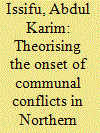|
|
|
Sort Order |
|
|
|
Items / Page
|
|
|
|
|
|
|
| Srl | Item |
| 1 |
ID:
181085


|
|
|
|
|
| Summary/Abstract |
In the vast literature on terrorism the choice of weapons has received relatively limited attention, despite the importance and visibility of this topic. Building on the literature on innovation in terrorism, the article first proposes a multi-level analytical framework that helps study terrorist weapon selection. It then investigates the use of weapons in jihadist attacks in Europe from 2014, with the rise of the so-called Islamic State, until 2020, based on an original database. The empirical analysis shows that the two traditional types of weapon of modern terrorism, firearms and explosives, were largely replaced by more primitive tools like melee weapons. In fact, in recent years jihadist terrorists in Europe have become less technologically advanced. Based on the original analytical framework, the article examines the reasons of this evolution, paying special attention to the use of the most common type of weapon in the database, bladed weapons, and the most lethal type, firearms.
|
|
|
|
|
|
|
|
|
|
|
|
|
|
|
|
| 2 |
ID:
181088


|
|
|
|
|
| Summary/Abstract |
This article presents a comparative analysis of the political transitions occurring in neighbours Ethiopia and Sudan since 2018. To date, these political transitions have largely been analysed independently. While the transition in Sudan is often characterised as a revolution, events in Ethiopia are not usually so described. However, despite the narrative and substantive differences, this article argues that there are important similarities in both countries’ contextual circumstances and processes of change. These include the trajectory of concurrent decline of the previous regimes, elements of continuity of the new transitional governments with the previous regimes, societal, especially youth, expectations of change, the rise of a new generation of political leadership, the role of women, the continuing difficulties and challenges of subnational politics, the persistence of economic drivers of political change and discontent, and, most recently, the impact of the COVID-19 pandemic. Moreover, developments in both countries inform and reinforce each other, with consequences for stability and conflict, as the recent prospect of a Sudan-Ethiopia border war starkly demonstrates. Understanding and contextualising the politics of change in one country would benefit from greater comparative analysis of its neighbour.
|
|
|
|
|
|
|
|
|
|
|
|
|
|
|
|
| 3 |
ID:
181087


|
|
|
|
|
| Summary/Abstract |
Communal conflicts present a severe threat to human security, resulting in the death of thousands of people every year. The communal conflict in Dagbon in the Northern Region of Ghana, for instance, led to the murder of the King of Dagbon and 40 other people. This conflict has attracted debates which are centred around attempts to explain its onset. But the understanding of this phenomenon is still incomplete. In particular, there is inadequate detailed information about what actually started the conflict. This article aims to fill this knowledge gap by engaging the greed-grievance theories to comprehensively understand the conflict’s onset. This article contributes to the theoretical understanding of communal conflicts, which is of both scholarly and policy importance. Navigating insights from theoretical literature and content analysis of secondary data, it finds that perceived injustice and land wealth were the motivating factors in the onset of the conflict in Dagbon in 2002.
|
|
|
|
|
|
|
|
|
|
|
|
|
|
|
|
| 4 |
ID:
181086


|
|
|
|
|
| Summary/Abstract |
Youth have long been involved in informal peacebuilding, and the United Nations’ recent adoption of the Youth, Peace and Security (YPS) Agenda makes space for more formal involvement. These policy developments echo scholarship highlighting gender as crucial to understanding the roles and experiences of young people across a range of conflict-affected settings. This understanding is necessary to ensuring gender-equitable youth peacebuilding efforts. Yet much remains to be done in theory, policy, and practice to pursue these ends. This work will necessarily involve considering the diverse roles gender may play in young people’s everyday experiences of peacebuilding across a range of settings. The majority of the world’s young people reside in Asia and the Pacific. Yet, more research on YPS is needed in the region, particularly when it comes to accounting for gender. Reflecting on existing research, this article considers learnings to date and seeks to develop a future research agenda.
|
|
|
|
|
|
|
|
|
|
|
|
|
|
|
|
|
|
|
|
|